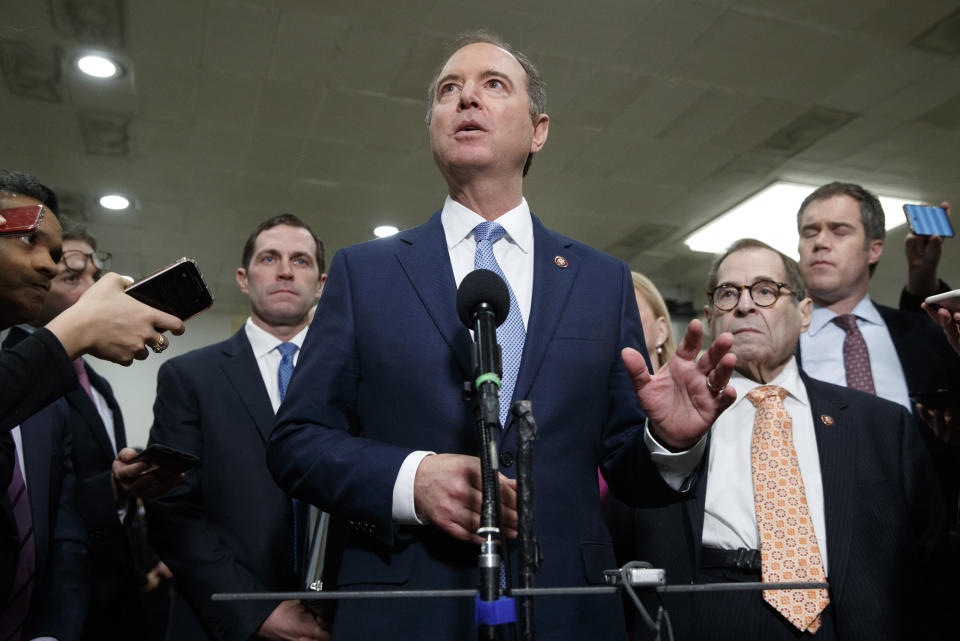Schiff lobbies Chief Justice Roberts to rule on questions of executive privilege
- Oops!Something went wrong.Please try again later.
- Oops!Something went wrong.Please try again later.
WASHINGTON — Rep. Adam Schiff, the lead House prosecutor, called on Chief Justice John Roberts to expedite rulings on any disputes between Congress and President Trump over witness testimony and documents, if the Senate votes to allow them.
“We have a very capable justice sitting in that Senate chamber empowered by the Senate rules to decide issues of evidence and privilege,” Schiff, the Democratic congressman from California leading the case for impeachment, told reporters prior to the last day of opening arguments for the House impeachment managers.
Republicans have said over the past day or so that one reason to vote against subpoenas for documents and witnesses in the trial is that it would drag out the process too long, because Trump would claim executive privilege and the matter would get bogged down in the courts.
Sen. Lisa Murkowski, who is considered one of the key swing votes on the issue of additional evidence, echoed these talking points in comments to reporters on Thursday, faulting the House for not pursuing the matter in the courts and raising doubts that she will vote to authorize Senate subpoenas.
Schiff called the Republicans’ argument “the last refuge of the president’s team’s effort to conceal the evidence from the American people.”
And Schiff publicly lobbied the chief justice, leaning into an argument that Roberts, who is presiding over the trial, can and should weigh in if and when such a showdown between the legislative and executive branches occurs.

“We have a justice who is able to make those determinations, and we trust that the chief justice can do so,” Schiff said.
His use of the word “trust” was an indication that Roberts’s intervention is not a certainty, and some observers of the chief justice believe he may seek to avoid involvement in any disagreements of substance.
Ryan Goodman, a law professor at New York University and editor in chief of its Just Security website, said Roberts’s intervention was “uncertain.”
“The rule allows him to not render a decision first and instead submit it back to the Senate,” Goodman said.
Ira Goldman, a longtime House and Senate staffer, said, “Roberts has the gavel. He can do all sorts of things. … I’m waiting for him to do something to get a read on what he might do when it gets serious.”
Schiff also acknowledged that even if the chief justice were to rule against Trump’s claims of executive privilege, the Senate could overrule him with a 51-vote majority.
But, he said, “what the president’s team fears … is that the justice will in fact apply executive privilege to that very narrow category where it may apply, and here that category may be nowhere at all, because you cannot use executive privilege to hide wrongdoing or criminality or impeachable misconduct.”
As Republicans have pointed out, the president’s lawyers could try to interfere with a decision that goes against them in the Senate by dragging the matter into federal court. Once there, however, they would have a hard time persuading the courts to hear their objections on the merits.
“There is no review of the presiding officer’s rulings other than by the Senate itself,” the conservative attorney and Trump critic George Conway wrote on Twitter last November. “And everything the Senate does you should assume to be judicially unreviewable.”
Goodman agreed, saying that if the chief justice ruled on the question of executive privilege and Trump’s lawyers tried to appeal that ruling, “the federal courts will turn [the president] away.”

“The only question is how quickly,” he added, noting that even a decision to toss the president out of court could end up winding its way through the appellate courts.
The ultimate outcome of such an appeal, Goodman said, is likely not in doubt.
“At the end of the day,” he said, “all that litigation ends up at the Supreme Court, where the chief justice who signed the subpoena would be the swing vote. So the result likely would be foreordained.”
Senate Democrats have asked that four new witnesses be called during the impeachment trial: Mick Mulvaney, acting White House chief of staff; John Bolton, former national security adviser; Michael Duffey, Office of Management and Budget associate director for national security; and Robert Blair, senior adviser to the acting White House chief of staff. Republicans have warned that those subpoenas would be opposed by the president with claims of executive privilege.
Senate Minority Leader Chuck Schumer said Friday that the executive privilege assertion would not apply to Bolton.
“Mr. Bolton already announced he’d testify if the Senate issued a subpoena,” Schumer told the press. “He’s not in the executive branch. So executive privilege cannot be used against him, because it can’t be used to prevent a witness who’s willing to testify.”
Whether the president can use executive privilege to stop a voluntary witness like Bolton from telling senators all he knows, or whether Schumer’s argument will prevail, is among the key issues that Schiff is publicly lobbying Roberts to decide.
_____
Read more from Yahoo News:
The inside story of how the U.S. gave up a chance to kill Soleimani in 2007
Yahoo News/YouGov poll shows two-thirds of voters want the Senate to call new impeachment witnesses
Steyer: U.S. reparations for slavery will help 'repair the damage'
As Trump impeachment trial nears, the battle turns to witnesses




